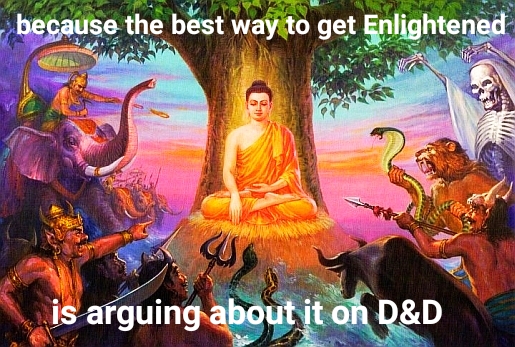I might experience dukkha if I found out that some monkeys had eaten all the ice-cream in the forest. 
I guess we will just have to agree to disagree ![]() be well!
be well!
so i have heard. At one time the Buddha was staying near Rājagaha in the Maddakucchi deer park. Now at that time the Buddha’s foot had been cut by a splinter. The Buddha was stricken by harrowing pains; physical feelings that were painful, sharp, severe, acute, unpleasant, and disagreeable. But he endured with mindfulness and situational awareness, without worrying. And then he spread out his outer robe folded in four and laid down in the lion’s posture—on the right side, placing one foot on top of the other—mindful and aware.
Then, late at night, several glorious deities of the Satullapa Group, lighting up the entire Maddukucchi, went up to the Buddha, bowed, and stood to one side. Standing to one side, one deity was inspired to exclaim in the Buddha’s presence: “The ascetic Gotama is such an elephant, sir! And as an elephant, he endures painful physical feelings that have come up—sharp, severe, acute, unpleasant, and disagreeable—with mindfulness and situational awareness, without worrying.”
I’m still not clear what you’re saying. Are you saying that some dukkha ceases at the point of Nibbana, and the rest ceases when the Arahant dies? And if so, which bits of dukkha cease at Nibbana?
Or are you saying something else?
I’m suggesting that if the context is the living arahant’s mind, the end of dukkha refers to the end of greed, hatred and delusion of the mind.
If the context is the end of rebirth/continued existence, the end of dukkha refers to the breaking up of the aggregates never to arise again.
Since ‘breaking up of the aggregates never to arise again’ implies a mind free of greed, hatred and delusion’, and a mind free of greed, hatred and delusion implies ‘aggregates that break up never to arise again’, speaking in this way is not contradictory, or about two different things.
I’m not sure I am able to make it more clear than this, if it doesn’t make sense I suggest we just leave this discussion aside for now ![]()
So you are saying that it ends twice, without arising in between those two ends. Like extinguishing a light in a room that has absolutely no light. I am so curious as to why you believe such a thing is possible even theoretically!
I’m also happy to disagree. Just rather bemused!
Since you are so curious ![]() take a movie; does it end when the credits start or when the credits are over?
take a movie; does it end when the credits start or when the credits are over?
To me, it makes sense that the phrase ‘the movie is over’ can apply both to when the credits start rolling, and when the credits are over.
Imagine you are watching a movie with a friend, the credit starts rolling, your friend says ‘let’s go, the movie is over’, but you stay watching the credits. When the credits are finally over, your friend says ‘come one, let’s go already, the movie is over!’
Would you then, bemused, turn to your friend and say “So you are saying that it ends twice, without arising in between those two ends. Like extinguishing a light in a room that has absolutely no light. I am so curious as to why you believe such a thing is possible even theoretically!”
Your friend would then maybe say ‘okay, the movie was over when the credits started, but it was totally over when the credits ended – the only thing between these two points was the text rolling down on the screen, there was nothing new there relevant to the plot or story of the movie’.
Would you still insist that your friend is committing an incomprehensible logical contradiction by speaking in this way?
You are talking about two different events - one, the end of the actual story of the movie; two, the end of the moview including the credits. These are two different events which are specifically defined differently.
Your example of dukkha ending on two separate occasions without it arising in between, is entirely different from your example. Why? Because you define the first event as the ending of dukkha, and you define the second event also as the ending of dukkha.
Remember that the ‘it’ you claim your simile is referring to is dukkha:
Your simile therefore naturally says that dukkha is not “totally over” until the arahant is dead. Which absolutely means that the arahant still has dukkha - dukkha is not ended. You don’t seem to realise that saying something is not absent, means that it is present.
You leave yourself with only two logical options to make your view logical or coherent. 1) You must not define the first event as the end of dukkha, rather say that the atttainment of arahantship is not the end of dukkha, that arahants still have dukkha, and that dukkha only ends at the death of the arahant.
2) Arahantship is the ending of dukkha, and death is unconnected to the ending of dukkha. Yet the term nibbāna still applies (as also does parinibbāna) since it is their final life, and so their death means that their cycle of rebirth has now been ‘extinguished’.
Please note that this a place for friendly discussion, not for proving points of view or wining arguments. These are all just views.
Just gonna leave this here… 
